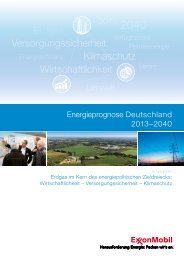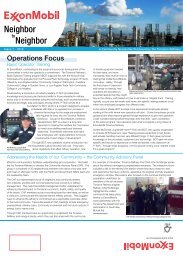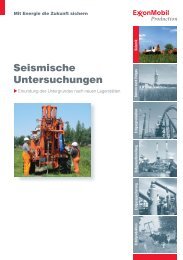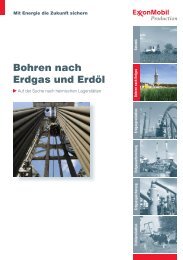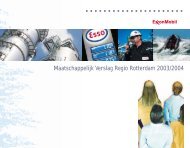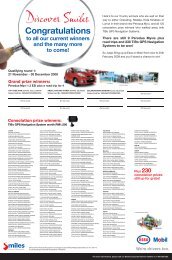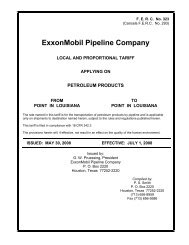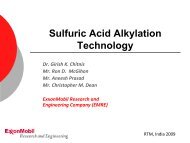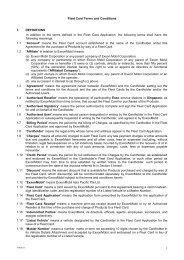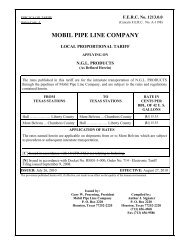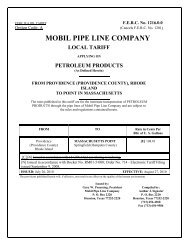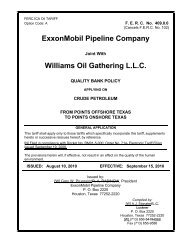The Lamp - ExxonMobil
The Lamp - ExxonMobil
The Lamp - ExxonMobil
Create successful ePaper yourself
Turn your PDF publications into a flip-book with our unique Google optimized e-Paper software.
2008 marks 90th year<br />
for <strong>The</strong> <strong>Lamp</strong> publication<br />
In 1918, the strains of growth<br />
and rapid change were being<br />
felt throughout Standard Oil<br />
Company (New Jersey).<br />
<strong>The</strong> company’s assets had<br />
nearly doubled to $700 million<br />
in six years, mainly due to an<br />
increased focus on building its<br />
oil-supply base in the United<br />
States and overseas. With the<br />
naming of Walter Teagle as president<br />
in 1917, the company’s<br />
expansion had accelerated.<br />
Meanwhile, as the “war to<br />
end all wars” raged on, Jersey<br />
Standard continued to run its production,<br />
refining and transportation<br />
operations at full throttle. <strong>The</strong><br />
effort eventually would provide<br />
one-fourth of the total petroleum<br />
requirements of the United States<br />
and its allies in World War I.<br />
Despite the heightened activity,<br />
Jersey Standard managed<br />
to achieve dramatic change on<br />
yet another front. <strong>The</strong> company<br />
and refinery employees in early<br />
1918 negotiated one of the<br />
most progressive benefits/laborrelations<br />
packages of that time.<br />
It included proposals recommended<br />
by industrial relations<br />
pioneer Clarence Hicks, who<br />
along with Teagle supported an<br />
eight-hour workday.<br />
11<br />
Story by Mike Long<br />
Today, <strong>The</strong> <strong>Lamp</strong> has a readership<br />
of more than 650,000 who look to<br />
the magazine for information about<br />
<strong>ExxonMobil</strong> and the energy industry.<br />
Lighting <strong>The</strong> <strong>Lamp</strong><br />
With change “busting out all<br />
over” at Jersey, the company<br />
recognized it needed a formal<br />
avenue for keeping employees<br />
informed. While president of<br />
Jersey’s Imperial Oil Limited<br />
affiliate in Canada, Teagle had<br />
launched the Imperial Oil Review<br />
in 1915. He valued how the<br />
magazine with its company news<br />
and information had helped build<br />
employee morale. After becoming<br />
president of Jersey, Teagle<br />
invited Imperial Oil Review Editor<br />
Victor Ross, a former Toronto<br />
Globe financial writer, to come<br />
to the company’s 26 Broadway<br />
headquarters in New York to<br />
help him “light <strong>The</strong> <strong>Lamp</strong>.”<br />
<strong>The</strong> editorship was soon<br />
turned over to Northrop Clarey,<br />
former financial editor of <strong>The</strong> New<br />
York Times. However, Teagle<br />
served as <strong>The</strong> <strong>Lamp</strong>’s ex officio<br />
editor-in-chief, generating article<br />
ideas, offering copy edits and dictating<br />
editorial topics.<br />
Volume 1, Number 1 of <strong>The</strong><br />
<strong>Lamp</strong>, published in May 1918,<br />
outlined Teagle’s original objective<br />
for the magazine, that it<br />
cultivate “a spirit of fellowship<br />
and cordial cooperation” among<br />
employees. But he also envi-<br />
Since its founding, more than 400 issues – and some<br />
12,000 pages of articles – have been published.<br />
sioned a much wider purpose,<br />
that its “rays will reach everyone<br />
interested directly or indirectly in<br />
the fortunes of the company,”<br />
allowing “no shadows of misconception<br />
nor suspicion to endure,”<br />
and that “it will prove to be a<br />
lighthouse in the uncharted seas<br />
of the future.”<br />
<strong>The</strong> public takes notice<br />
That wider purpose soon began<br />
to bear fruit. Investors, shareholders,<br />
government officials, teach-<br />
ers, librarians, newspaper editors<br />
and other nonemployees increasingly<br />
looked to the magazine as<br />
a reliable source of information<br />
about the company and the international<br />
petroleum industry.<br />
While the magazine continued<br />
to cover benefits issues and local<br />
news of direct interest to employees,<br />
stories titled “Why Gasoline<br />
Now Costs More” and “Increasing<br />
Crude Supply” (topics that lately<br />
have recaptured the public’s<br />
attention) had wide appeal, partic




